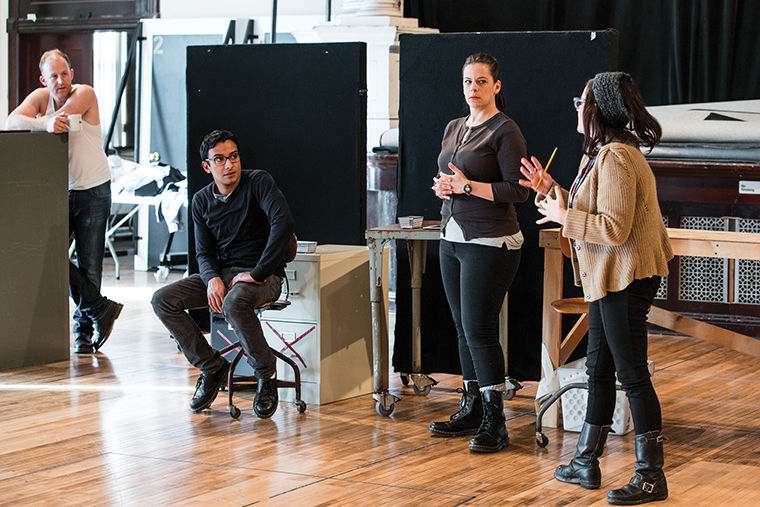‘1984’ is timely—Big Brother’s threat remains
Courtesy Steppenwolf Theatre Company
Andrew White’s adaptation of “1984” was first performed at the Looking Glass Theater in 2004, but the show has been significantly updated for the Steppenwolf Theatre.
October 19, 2015
Steppenwolf for Young Adults is set to open its 2015–2016 season with a multimedia adaptation of George Orwell’s landmark dystopian novel “1984” Oct. 21 at the Steppenwolf Theatre, 1650 N. Halsted St.
Published in 1949, “1984” grapples with diverse themes, including the relationship between language and thought, the repression of individuality and the manipulation of information, according to Richard Chwedyk, an adjunct professor in the Creative Writing Department.
“[‘1984’] is a fictional landscape that closely resembles many aspects of the world where we’re living in today,” Chwedyk said. “It isn’t necessarily one government or one totalitarian system. In many ways, it’s corporations or the media.”
The term “Big Brother” has entered the popular lexicon as a shorthand for authoritarian power as a testament to the lasting impact of “1984,” according to Chwedyk.
The Steppenwolf for Young Adult’s adaptation strives to bring the value of “1984” to a new generation that might not be as familiar with the book, said Hallie Gordon, director of the play and artistic producer for Steppenwolf for Young Adults.
“Many kids have tried to read the book and found it boring or challenging,” Gordon said. “[When they] saw the play, they understood the world better and were able to go back and finish the reading.”
According to Andrew White, who adapted the novel for Steppenwolf, seeing the play in a live setting and being able to hold an open conversation about it afterward is paramount to appreciating its value.
Referring to recent trends toward dystopian settings in young adult fiction, White said, “I think it’s great for young audiences to revisit the foundation text that inspired so many of those new dystopian novels.”
Though he was a visionary in many ways, Orwell might be surprised by certain features of the new work. According to Gordon, the stage version of “1984” makes use of a variety of multimedia displays, including smartphones, tablets and video projections, in an attempt to mirror the current cultural climate.
“I thought it was important to look at ‘1984,’ not in terms of paper, but in terms of the way a lot of us get information now,” Gordon said.
White added that given the advent of cellphones and mobile computing, this is the first time in history the technology necessary to make the surveillance state of “1984” possible exists.
Other current issues “1984” seeks to address on stage include the NSA leaks, election season and climate change, White said. Chwedyk cited the potential for science fiction to function as a lasting vehicle for social commentary.
“More than it is a literary form, science fiction is a way of looking at the world,” Chwedyk said. “It offers an opportunity to exaggerate certain aspects of a society and put them to the test.”
White echoed that view, stressing how “1984” traces human social proclivities to their furthest logical conclusion.
“Even if we were to enter a utopia next week—if the train of the universe left us off at that stop—we would still read ‘1984,’” Chwedyk said. “We would still read stories about people who feel strongly and passionately about the human condition.”
“1984” opens at the Steppenwolf Theater Oct. 21 and will continue through Nov. 20. Tickets are $20 Visit www.steppenwolf.org for more information.








